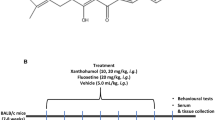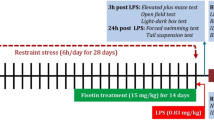Abstract
Fucoxanthin (FX), a natural carotenoid abundant in edible brown seaweeds, has been shown the great anti-oxidant, anti-inflammatory and anti-diabetic effects in vivo and in vitro. The present study was designed to investigate the effects of FX on lipopolysaccharide (LPS)-induced behavioral defects in mice. In depressive behavior tests, the increased immobility time of forced swimming test and tail suspension test by LPS treatment in mice, which were significantly reversed by FX treatment (200 mg/kg, i.g.). In anxiety behavior tests, LPS injection was neither influence the anxiety-related parameters in marble burying test nor that in elevated plus maze test. Interestingly, anxiolytic effects were observed in single FX treated control and LPS-induced mice groups. FX treatment also reversed LPS-induced body weight loss and food intake decreases. Biochemical analysis indicated that FX inhibited LPS-induced overexpression of pro-inflammatory cytokines (IL-1β, IL-6 and TNF-α), as well as iNOS and COX-2 in the hippocampus, frontal cortex and hypothalamus, via the modulation of AMPK-NF-κB signaling pathway.








Similar content being viewed by others
References
Bai A, Ma AG, Yong M, Weiss CR, Ma Y, Guan Q, Bernstein CN, Peng Z (2010) AMPK agonist downregulates innate and adaptive immune responses in TNBS-induced murine acute and relapsing colitis. Biochem Pharmacol 80:1708–1717
Chang YH, Chen YL, Huang WC, Liou CJ (2018) Fucoxanthin attenuates fatty acid-induced lipid accumulation in FL83B hepatocytes through regulated Sirt1/AMPK signaling pathway. Biochem Biophys Res Commun 495:197–203
Csaki C, Mobasheri A, Shakibaei M (2009) Synergistic chondroprotective effects of curcumin and resveratrol in human articular chondrocytes: inhibition of IL-1betainduced NF-kappaB mediated inflammation and apoptosis. Arthritis Res Ther 11:R165
Dantzer R, O’Connor JC, Freund GG et al (2008) From inflammation to sickness and depression: when the immune system subjugates the brain. Nat Rev Neurosci 9:46–56
Giri S, Nath N, Smith B, Viollet B, Singh AK, Singh I (2004) 5-Aminoimidazole-4- carboxamide-1-beta-4-ribofuranoside inhibits proinflammatory response in glial cells: a possible role of AMP-activated protein kinase. J Neurosci 24:479–487
Girotti M, Donegan JJ, Morilak DA (2011) Chronic intermittent cold stress sensitizes neuro-immune reactivity in the rat brain. Psychoneuroendocrinology 36:1164–1174
Hayley S, Brebner K, Lacosta S, Merali Z, Anisman H (1999) Sensitization to the effects of tumor necrosis factor-alpha: neuroendocrine central monoamine, and behavioral variations. J Neurosci 19:5654–5665
Jiang X, Chen L, Shen L, Chen Z, Xu L, Zhang J, Yu X (2016) Trans-astaxanthin attenuates lipopolysaccharide-induced neuroinflammation and depressive-like behavior in mice. Brain Res 1649(Pt A) 1649:30–37
Jiang X, Liu J, Lin Q, Mao K, Tian F, Jing C, Wang C, Ding L, Pang C (2017) Proanthocyanidin prevents lipopolysaccharide-induced depressive-like behavior in mice via neuroinflammatory pathway. Brain Res Bull 135:40–46
Judd LL, Schettler PJ, Coryell W, Akiskal HS, Fiedorowicz JG (2013) Overt irritability/anger in unipolar major depressive episodes: past and current characteristics and implications for long-term course. JAMA Psychiat 70:1171–1180
Kang SI, Shin HS, Kim HM, Yoon SA, Kang SW, Kim JH, Ko HC, Kim SJ (2012) Petalonia binghamiae extract and its constituent fucoxanthin ameliorate high-fat diet-induced obesity by activating AMP-activated protein kinase. J Agric Food Chem 60:3389–3395
Kim JM, Han HJ, Hur YH, Quan H, Kwak SH, Choi JI, Bae HB (2015) Stearoyl lysophosphatidylcholine prevents lipopolysaccharide-induced extracellular release of high mobility group box-1 through AMP-activated protein kinase activation. Int Immunopharmacol 28:540–545
Kirsten TB, Galvão MC, Reis-Silva TM, Queiroz-Hazarbassanov N, Bernardi MM (2015) Zinc prevents sickness behavior induced by lipopolysaccharides after a stress challenge in rats. PLoS One 10:e0120263
Koo JW, Russo SJ, Ferguson D, Nestler EJ, Duman RS (2010) Nuclear factor-kappaB is a critical mediator of stress-impaired neurogenesis and depressive behavior. Proc Natl Acad Sci U S A 107:2669–2674
Miyashita K (2009) Function of marine carotenoids. Forum Nutr 61:136–146
Monje FJ, Cabatic M, Divisch I, Kim EJ, Herkner KR, Binder BR, Pollak DD (2011) Constant darkness induces IL-6-dependent depressive-like behavior through the NF-κB signaling pathway. J Neurosci 31:9075–9083
Montezuma K, Biojone C, Lisboa SF, Cunha FQ, Guimarães FS, Joca SRL (2012) Inhibition of iNOS induces antidepressant-like effects in mice: pharmacological and genetic evidence. Neuropharmacology 62:485–491
Pangestuti R, Vo TS, Ngo DH, Kim SK (2013) Fucoxanthin ameliorates inflammation and oxidative reponses in microglia. J Agric Food Chem 61:3876–3883
Peng J, Yuan JP, Wu CF, Wang JH (2011) Fucoxanthin, a marine carotenoid present in brown seaweeds and diatoms: metabolism and bioactivities relevant to human health. Mar Drugs 9:1806–1828
Remus JL, Dantzer R. (2016) Inflammation models of depression in rodents: relevance to psychotropic drug discovery. Int J Neuropsychopharmacol 2016: 19(9). pii: pyw028
Russo E, Andreozzi F, Iuliano R, Dattilo V, Procopio T, Fiume G, Mimmi S, Perrotti N, Citraro R, Sesti G, Constanti A, de Sarro G (2014) Early molecular and behavioral response to lipopolysaccharide in the WAG/Rij rat model of absence epilepsy and depressive-like behavior, involves interplay between AMPK, AKT/mTOR pathways and neuroinflammatory cytokine release. Brain Behav Immun 42:157–168
Salminen A, Kaarniranta K (2012) AMP-activated protein kinase (AMPK) controls the aging process via an integrated signaling network. Ageing Res Rev 11:230–241
Smith DJ, Nicholl BI, Cullen B, Martin D, Ul-Haq Z, Evans J, Gill JMR, Roberts B, Gallacher J, Mackay D, Hotopf M, Deary I, Craddock N, Pell JP (2013) Prevalence and characteristics of probable major depression and bipolar disorder within UK biobank: cross-sectional study of 172,751 participants. PLoS One 8:e75362
Steru L, Chermat R, Thierry B, Simon P (1985) The tail suspension test: a new method for screening antidepressants in mice. Psychopharmacology 85:367–370
Tan CP, Hou YH (2014) First evidence for the anti-inflammatory activity of fucoxanthin in high-fat-diet-induced obesity in mice and the antioxidant functions in PC12 cells. Inflammation 37:443–450
Tomaz VS, Cordeiro RC, Costa AM et al (2014) Antidepressant-like effect of nitric oxide synthase inhibitors and sildenafil against lipopolysaccharide induced depressive-like behavior in mice. Neuroscience 268:236–246
Van Dam AD, Kooijman S, Schilperoort M et al (2015) Regulation of brown fat by AMP-activated protein kinase. Trends Mol Med 21:571–579
Wohleb ES, Hanke ML, Corona AW, Powell ND, Stiner LM, Bailey MT, Nelson RJ, Godbout JP, Sheridan JF (2011) Beta-adrenergic receptor antagonism prevents anxiety-like behavior and microglial reactivity induced by repeated social defeat. J Neurosci 31:6277–6288
Xiang S, Liu F, Lin J, Chen H, Huang C, Chen L, Zhou Y, Ye L, Zhang K, Jin J, Zhen J, Wang C, He S, Wang Q, Cui W, Zhang J (2017) Fucoxanthin inhibits β-amyloid assembly and attenuates β-amyloid oligomer-induced cognitive impairments. J Agric Food Chem 65:4092–4102
Yoshino Y, Ochi S, Yamazaki K, Nakata S, Abe M, Mori Y, Ueno SI (2015) Antidepressant action via the nitric oxide system: a pilot study in an acute depressive model induced by arginin. Neurosci Lett 599:69–74
Yu HY, Cai YB, Liu Z (2015a) Activation of AMPK improves lipopolysaccharide-induced dysfunction of the blood-brain barrier in mice. Brain Inj 29:777–784
Yu Y, Wu S, Li J, Wang R, Xie X, Yu X, Pan J, Xu Y, Zheng L (2015b) The effect of curcumin on the brain-gut axis in rat model of irritable bowel syndrome: involvement of 5-HT-dependent signaling. Metab Brain Dis 30:47–55
Yu X, Jiang X, Zhang X, Chen Z, Xu L, Chen L, Wang G, Pan J (2016) The effects of fisetin on lipopolysaccharide-induced depressive-like behavior in mice. Metab Brain Dis 31:1011–1021
Zhang H, Tang Y, Zhang Y, Zhang S, Qu J, Wang X, Kong R, Han C, Liu Z (2015) Fucoxanthin: a promising medicinal and nutritional ingredient. Evid Based Complement Alternat Med 2015:723515
Zhang L, Wang H, Fan Y, Gao Y, Li X, Hu Z, Ding K, Wang Y, Wang X (2017) Fucoxanthin provides neuroprotection in models of traumatic brain injury via the Nrf2-ARE and Nrf2-autophagy pathways. Sci Rep 7:46763
Zlatković J, Filipović D (2013) Chronic social isolation induces NF-κB activation and upregulation of iNOS protein expression in rat prefrontal cortex. Neurochem Int 63:172–179
Acknowledgements
Xi Jiang, Guokang Wang and Qizhi Yan contributed equally to this work. This work was funded by scientific research project of Zhejiang Provincial Natural Science Foundation of China (LGF18H090014) for Xuefeng Yu; Science and technology project of Zhejiang medical and health department (2017182371), Natural Science Foundation of Ningbo (2017A610175) for Xi Jiang; Shaoxing health and family planning science and technology project (2017QN005), Shaoxing People’s Hospital scientific research project (2017B13) for Qizhi Yan.
Author information
Authors and Affiliations
Contributions
Xi Jiang, Qizhi Yan and Xuefeng Yu designed the research study. Xi Jiang, Qizhi Yan and Guokang Wang conducted the experiments. Xi Jiang and Xuefeng Yu analyzed the data. Zhihua Tang, Guokang Wang, Qian Lin and Xuefeng Yu wrote the manuscript.
Corresponding authors
Ethics declarations
Conflicts of interest
The authors declare no conflict of interest.
Additional information
Publisher’s note
Springer Nature remains neutral with regard to jurisdictional claims in published maps and institutional affiliations.
Rights and permissions
About this article
Cite this article
Jiang, X., Wang, G., Lin, Q. et al. Fucoxanthin prevents lipopolysaccharide-induced depressive-like behavior in mice via AMPK- NF-κB pathway. Metab Brain Dis 34, 431–442 (2019). https://doi.org/10.1007/s11011-018-0368-2
Received:
Accepted:
Published:
Issue Date:
DOI: https://doi.org/10.1007/s11011-018-0368-2




